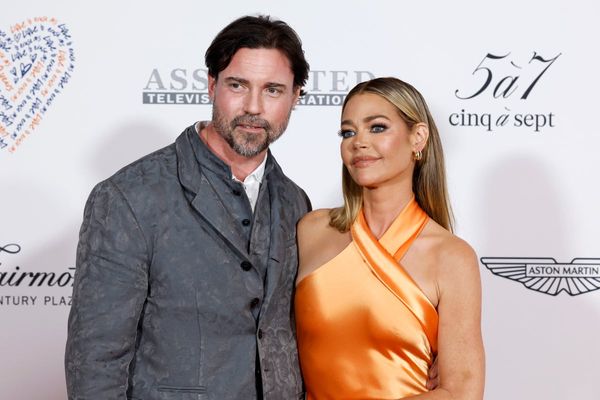
Brrr, it looks cold in Summit, Utah. It is a mountain resort for rich people, so there is snow, obviously, and the icy heart of capitalism, but Steven Soderbergh turns down the thermostat even further with a flinty blue and grey palette for Mosaic (17 February, Sky Atlantic). It is enough to make you reach for a cardigan. A woman called Olivia has been murdered and it is not looking good for Joel, a young man soon revealed as her handyman/lodger(/lover?). Mosaic opens with a police officer running through the mounting evidence against him in a creepy Shining-style hotel corridor. It does not look very official.
We jump back four years. Olivia Lake (Sharon Stone), a successful and wealthy children’s author, is hosting a fundraising party, attended by her rich neighbours, to raise money for her children’s arts charity, Mosaic. It is here that she meets Joel Hurley, an aspiring comic book artist, who is manning the bar. “Pour me something tall and muscular,” she instructs him. Then, to her gay best friend and prowling-partner JC (Paul Reubens, AKA Pee-wee Herman), she adds: “A lesser-nuanced host might have said ‘stiff’.”
Then there’s Olivia’s neighbour, Michael, who is trying to get her to sell her house. He has had some exploratory work done and there are precious metals on the land – beryllium, apparently – although he talks up the desirability of the “pristine views”. You think they are on good terms – at the fundraiser, hosted at his house, Michael describes her as his “surrogate mom”. But here they are, having an unpleasant exchange in Olivia’s kitchen. “You know when you’ll know when I’m moving on? When you’re standing at my grave site with whatever’s left of my mourners – and then you can negotiate with my dogs,” she spits. So, he has to be a suspect as well. He employs a conman to seduce Olivia and get her to sell – Eric Neil, sly and toothy as a crocodile, so he joins the list, too.
Mosaic premiered as an app last year, for viewers to work their way through the story, following trails and perspectives. There was a lot of hype about Soderbergh’s adventure in experimental storytelling, but there has been less about his linear six-part TV cut, other than how successfully it could transfer to a bigger screen. I did not “play” the app, but the TV version looks like a conventional, stylish thriller. There are familiarities for Soderburgh watchers – the closeups, the atmospheric sound, the feeling you have no idea what is going on. None of the characters are remotely likable, which might grate across six episodes. But it is intriguing, the setting is compelling and Stone is excellent, doing her thing – charismatic, sexually confident, icy.

On Hold the Sunset (18 February, BBC One), John Cleese is doing his thing – imperious, comically scathing. This is his first return to the BBC since 1979, when he starred in a little-known show called Fawlty Towers. He has said it was the brilliant script that tempted him back. You wonder if this was the one he read. There are some nice lines, though. “It could give us 10 more years,” says Phil (Cleese), trying to persuade his neighbour, Edith (Alison Steadman), to marry him. “Or finish us off,” she says. Later, Cleese manages to say: “I’m trying to look on the bright side,” with a straight face. It is hardly firecracker stuff.
But I quite like the show, mainly because of the chemistry of the leads and because theirs is a stage of life that feels underexplored. Phil and Edith are old flames who married other people. Now widowed and living across the road from each other, they are back together. Edith has just accepted Phil’s marriage proposal when the doorbell rings. Her son, a berk called Roger (Jason Watkins) – nearly 50 – announces he has left his wife and children (“I’ve especially left them”) and is moving home to relive his adolescence. And he has quit his job to write a social history of the Bash Street Kids.
It is gentle and undemanding; Cleese superfans may be disappointed at the lack of laughs. The funniest moment, however farfetched, is when Roger gets stuck in a window (“This was an adventure; I was on a quest!”) after his abandoned wife (Rosie Cavaliero, who has not been this irritating since her brilliantly annoying character in Jam & Jerusalem) turns up and starts virtue-signalling over an old dressing gown.
Still, if the whole thing is about second chances, it is good to have Cleese back in a BBC sitcom.







